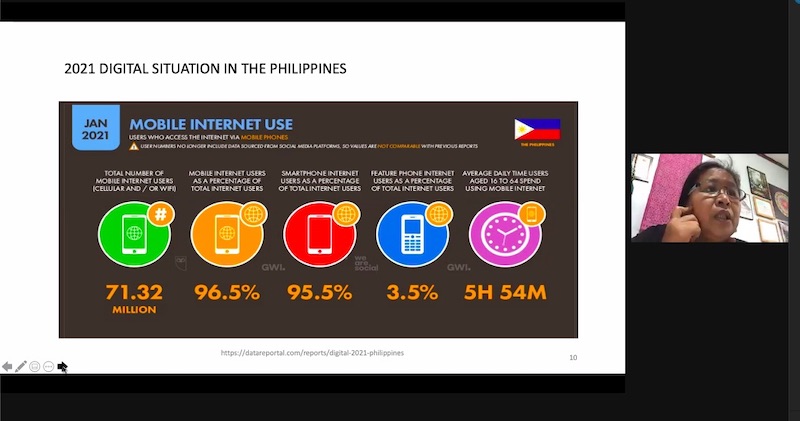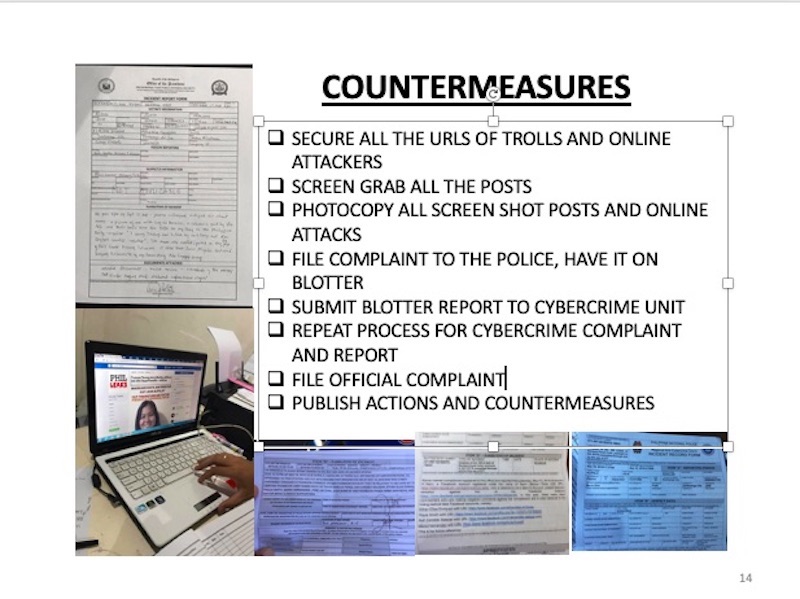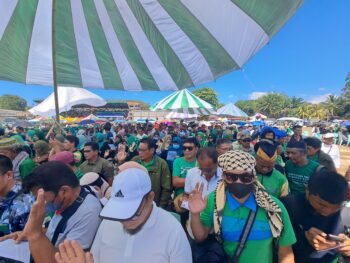KORONADAL CITY (MindaNews / 26 June) — In the digital age, it is imperative for smartphone users, especially journalists, to practice “gadget hygiene” to avoid becoming victims of hackers and cybercriminals or fall prey to surveillance.
This was the main message of Julieta “Julie” Alipala, senior reporter of the Philippine Daily Inquirer and a digital safety fellow of the Berlin Scholarship Programme, to at least 30 fellow Mindanawon journalists during the “Training on Digital Safety for Journalists” on Friday
Gadget hygiene for digital safety means logging off from emails or social media accounts when not using them, regular changing of passwords using a strong mix of at least 12 characters, and using a 2-step verification to add an extra layer of security to your accounts, she explained.
 Julie Alipala (inset)talks about digital security during an online training for journalists in Region 12 (Soccsksargen) and the Bangsamoro on Friday, 25 June 2021.
Julie Alipala (inset)talks about digital security during an online training for journalists in Region 12 (Soccsksargen) and the Bangsamoro on Friday, 25 June 2021.
“It is a necessity for Filipinos nowadays to have a smartphone. It is easier to carry than laptops… As journalists, we use it almost 24/7 and we feel we can’t live without it to connect to the (internet),” Alipala said.
“Our world (now) revolves around this little gadget. You need to protect it if you want to protect yourself from digital attacks,” she added.
Data from www.reportal.com showed that of the estimated 110.3 million population in the Philippines in January 2021, 73.91 million are internet users while 89 million are social media users.
There were 152.4 million mobile connections in the Philippines in January 2021, which was equivalent to 138.2 percent of the total population, the data showed.
Of the internet users in the country aged 16 to 64, 98.5 percent own a smartphone, 77.3 percent own a laptop or desktop, and 33.2 percent own a tablet, it added.
Alipala said the consequences of not practicing digital safety, not just in smartphones but also in other communication gadgets such as laptops, personal computers and tablets, could be identity or information theft, hacked or deactivated accounts, file deletions, surveillance of calls and doxing, among others.
Doxing is the act of publicly revealing previously private personal information about an individual or organization, usually through the Internet.
So how do you know when your smartphone is bugged?
The signs could include fast depletion of battery even when you are not using the phone and strangely garbled signals even when the connectivity is stable, such as in a highly urbanized locality, Alipala said.
She also warned against using smartphones or laptops in free public wi-fi connections, as it exposes these gadgets to hackers who can steal the data stored in the devices.
 With their line of work, which includes exposing malfeasance and speaking truth to power, journalists are prone to online attacks, noted Alipala, who, for her work, had been called names such as “taong negra” (black woman), spokesperson of the Abu Sayyaf Group (ASG) or a terrorist by trolls or followers allegedly of the military and politicians.
With their line of work, which includes exposing malfeasance and speaking truth to power, journalists are prone to online attacks, noted Alipala, who, for her work, had been called names such as “taong negra” (black woman), spokesperson of the Abu Sayyaf Group (ASG) or a terrorist by trolls or followers allegedly of the military and politicians.
The ASG, which had pledged allegiance to the Islamic State, is outlawed by the Philippine government and had been classified by the United States as a foreign terrorist organization. Known to operate in Sulu and Basilan, the group has resorted to kidnappings and bombings to advance its cause.
Based in Zamboanga City, Alipala had received threats in connection with her reporting on the ASG, among others. She was harassed, verbally attacked, trolled and received death threats via text messages.
When attacked online, Alipala discouraged reporters from engaging the attackers but instead urged them to file a formal report to authorities and to seek the help of peer groups for support or assistance.
The digital safety training is part of the “Strengthening Safety of Journalists and Professional Journalistic Standards in the Philippines,” a project of the United Nations Educational, Scientific and Cultural Organization (UNESCO) -Jakarta supported by the Netherlands Funds-in-Trust, in partnership with the Mindanao Institute of Journalism, the organization that runs MindaNews.
At least 30 journalists from Soccsksargen (Region 12) and the Bangsamoro Autonomous Region in Muslim Mindanao joined the virtual training. Two more digital safety training sessions will be conducted for journalists from Davao and Caraga regions, and Northern Mindanao and Zamboanga Peninsula.
Besides the training on digital safety, the other trainings include safety in covering the pandemic, disasters, and peace and conflict coverage. (Bong S. Sarmiento / MindaNews)
